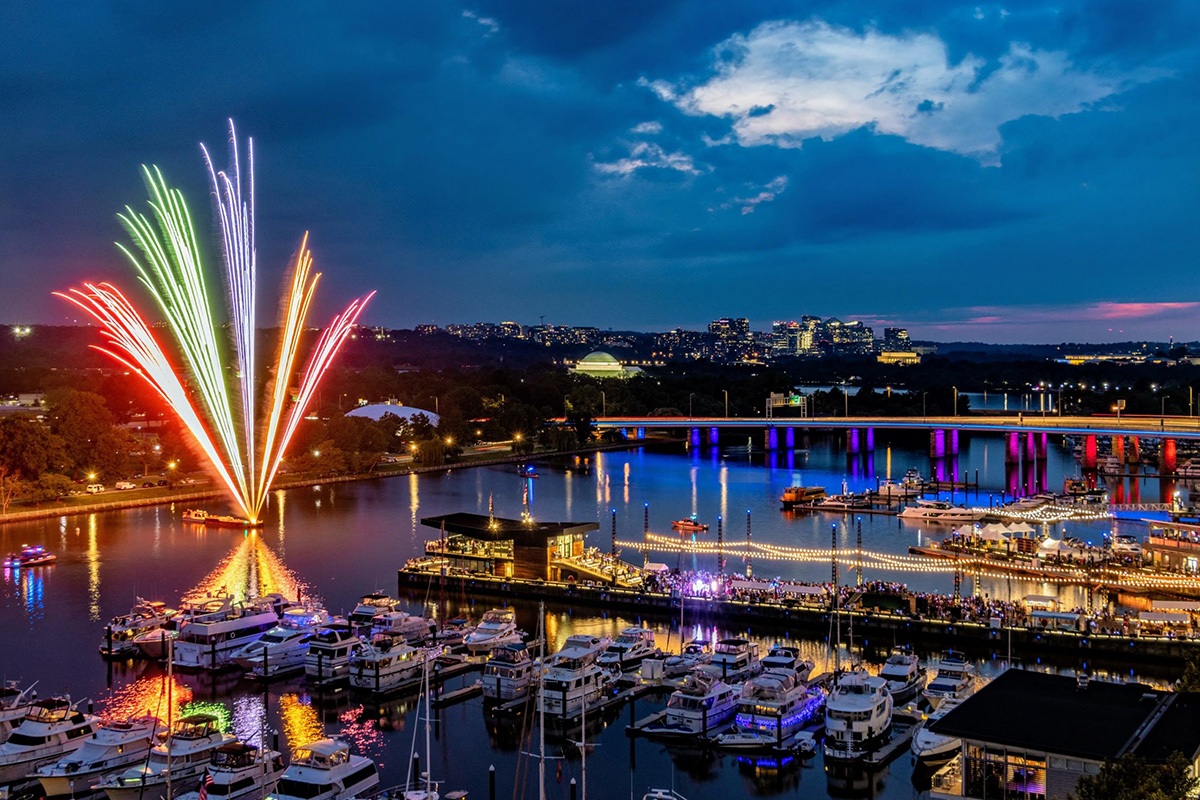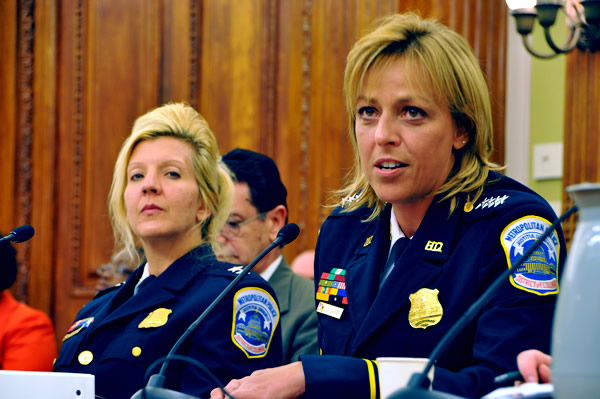Local
Police chief defends fight against anti-LGBT hate crimes
Lanier disputes claim that gay liaison unit ‘dying on vine’

D.C. Police Chief Cathy Lanier told a D.C. Council hearing on Wednesday that the department was making progress in its fight against hate crimes and strongly disputed criticism by the head of the police union that the Gay and Lesbian Liaison Unit was “dying on the vine.”
Her testimony before the Council’s Committee on the Judiciary came after several other witnesses, including D.C. police union chair Kristopher Baumann and LGBT activists, expressed concern that she had seriously weakened the GLLU’s central office, which had once led efforts to fight anti-LGBT hate crimes.
Lanier said some critics have misconstrued her efforts to decentralize and expand the GLLU and the department’s other special liaison units as an effort to discontinue or cut back on the units’ central offices.
“This expansion has not only improved our response to these communities throughout the city, by providing service 24 hours a day, seven days a week,” she said. “But it has also improved our ability to provide consistent information to these communities, while ensuring that information about their needs is integrated into services in each patrol district.”
D.C. Council member Phil Mendelson (D-At-Large), who chairs the committee, said he called the hearing to assess the extent of the city’s hate crimes problem and efforts by the police to address the problem. Other Council members participating in the hearing included Jim Graham (D-Ward 1), Mary Cheh (D-Ward 3) and Muriel Bowser (D-Ward 4).
Graham said he agreed with activists that the GLLU as a whole has been diminished over the past several years. He praised Lanier for doing overall excellent work in fighting crime throughout the city but said she appears to be making changes at the GLLU without “true engagement” from the community the unit is supposed to represent.
“I feel this is slipping away,” Graham said. “It’s a serious loss … This is the message we’re getting.”
Lanier said she could have reached out more to the community on a few issues, including her decision earlier this year to name a civilian administrator as head of the Special Liaison Division, which oversees the GLLU and liaison units working with the Latino, Asian and deaf and hard of hearing communities. But she said members of the GLLU have joined her in expressing disappointment in claims by critics that the unit is not doing as good a job as it has in the past.
Police statistics have shown that D.C. has the nation’s highest rate of anti-LGBT hate crimes, with anti-LGBT bias related crimes making up as much as 70 percent of the city’s overall hate crimes.
Lanier acknowledged that the number of reported hate crimes against the LGBT community has increased significantly in recent years. However, she said it could not be determined whether the actual number of such crimes has increased or whether the increase is due to more people coming forward to report such crimes.
According to D.C. police statistics, in 2010, the total number of reported hate crimes in the city was 68. Out of that total, 35 were crimes targeting gays, lesbians or bisexuals and 10 targeting members of the transgender community.
In 2009, a total of 41 hate crimes were reported, with 30 said to be against gays, lesbians or bisexuals and five based on the victim’s gender identity or expression.
A total of 39 hate crimes were reported in the city in 2008, with 26 said to be against gays, lesbians, or bisexuals and four against transgender persons.
As of June 30 of this year, there were a total of 38 reported hate crimes, according to police data released this week. Out of that total, 14 were based on the victim’s sexual orientation and two were based on the victim’s gender identity or expression.
“It is important to note that because the number of these crimes is relatively low, small shifts in numbers can look disproportionately large in percentages,” Lanier said in her testimony. “Therefore those percentages should be interpreted carefully while also considering the raw numbers.”

A.J. Singletary, president of the D.C. group Gays and Lesbians Opposing Violence, told the committee that Lanier and the department have taken some “laudatory measures” in recent years to combat hate crimes targeting the LGBT community.
But he said the department overall was not properly training officers to recognize and take reports on incidents of anti-LGBT bias that don’t involve a crime of violence but that could lead to violence.
“First, MPD is not documenting anti-LGBT bias incidents effectively, thereby endangering the community and impacting the use of vital resources to prevent hate crimes,” he said.
“Hate incidents – slurs, derogatory terms, or other similar actions – can be tracked and used to target areas of increasing problems across the city,” he told the committee. “We have anecdotal evidence of a disturbing increase in anti-LGBT incidents, including threats, harassment and intimidation.”
Singletary and other witnesses noted that police officials have encouraged citizens to report such incidents to police so that data can be compiled to monitor areas where hate crimes might surface.
“Despite this, GLOV is aware of numerous instances when MPD officers refused to take reports when called and even made the individual feel silly or petty for requesting that the incident be reported,” Singletary said.
Jason Terry, an official with the D.C. Trans Coalition, told the committee that many in the local transgender community lost confidence in police following a December 2010 incident in which an off-duty D.C. police officer assaulted a transgender woman on a downtown street. The woman, Chloe Moore, has accused the officer of assaulting her after she approached him to ask for a light for her cigarette.
The department’s Internal Affairs Division is currently investigating the incident.
Terry and D.C. transgender activist Jeri Hughes told the committee that police officers often assume incorrectly that transgender women, who report being harassed or assaulted because of their gender identity, are prostitutes.
GLOV members and other LGBT activists have complained that Lanier’s decision in 2009 to decentralize the GLLU by assigning affiliate members to the unit from each of the department’s seven police districts diminished the effectiveness of the unit’s central office, which is located in Dupont Circle.
At the time former Mayor Adrian Fenty appointed Lanier as police chief in 2009, there were seven to eight full-time GLLU officers assigned to the central office. The office, created by former Police Chief Charles Ramsey in 2000, became an internationally recognized police entity aimed at addressing issues involving the LGBT community.
Among other things, Ramsey gave GLLU officers full authority to investigate crimes and make arrests as well as to provide public information and outreach to the LGBT community.
Lanier has said she supports those efforts but wanted to expand the unit’s reach throughout the city. She assigned officers from the eight police districts to become affiliate GLLU officers who would continue to perform their regular duties in the districts while being on call to assume GLLU duties as the need arises in their respective districts.
Rick Rosendall, vice president of the Gay and Lesbian Activists Alliance, told the committee he and most other activists fully support the affiliate program. But Rosendall and other activists have said they strongly objected to what they believe has been Lanier’s removal of officers from the GLLU’s central office.
Sources familiar with the GLLU have told the Blade in recent years that the unit’s reputation within the department had diminished and other important units, like the homicide squad, had largely stopped calling on the GLLU for help in gay-related cases.
Lanier has disputed those claims, saying the central unit remains the hub of the GLLU. She told the Council hearing on Wednesday that affiliate members spend at least a month at the central office in a special training program.
She also told the hearing that there are now seven people assigned to the central GLLU office in addition to its part-time commander, Sgt. Carlos Mejia, who also serves as commander of the Latino Liaison Unit.
District of Columbia
LGBTQ budget advocates fight for D.C. resources in a tough fiscal year
‘Trying to preserve life-saving services’ amid $1 billion cut

The months and days leading up to June are especially busy for LGBTQ Washingtonians. For one group, the DC LGBT Budget Coalition, which works year-round to ensure LGBTQ residents are represented and financially supported by the D.C. government, this time of year is their Super Bowl. Beginning in April, the D.C. Council and Mayor’s Office hold budget hearings for the next fiscal year.
With D.C.’s budget now under review, the Washington Blade spoke with Heidi Ellis, coordinator of the DC LGBT Budget Coalition, about the group’s top priorities and their push to ensure continued support for queer communities.
“The LGBTQ Budget Coalition was founded in 2020 at the height of the pandemic, as a way for the community to work together to advocate for key funding and policy changes,” Ellis said. “We recognized we were stronger together. A lot of groups are often pitted against each other for resources and dollars. This coalition was founded out of a need for unity. Since then, we’ve successfully advocated for more than $20 million in dedicated LGBTQ investments.”
In addition to coordinating the coalition, Ellis is the founder and CEO of HME Consulting & Advocacy, a firm that helps build coalitions and advance policy initiatives that address intersectional issues in the LGBTQ community. One of its most powerful tools, she explained, is direct outreach through community surveys.
“We actually do community surveys to see what people need and what’s top of mind,” Ellis said. “Of course, we also pay attention to the broader political landscape — like the current threats to HIV funding. That helps us prioritize.”
Because the coalition is comprised of more than 20 organizations across various sectors —healthcare, housing, community organizing — Ellis said its diversity enables it to connect grassroots needs to potential policy solutions.
“Our coalition includes service providers, community groups, health and housing advocates-folks who are deeply plugged into what’s happening on the ground,” she said. “They help determine our direction. We know we don’t represent every queer person in D.C., but our coalition reflects a wide range of identities and experiences.”
The insights gathered through those surveys ultimately inform the coalition’s annual budget proposal, which is submitted to the Council and mayor.
“That’s how we got to our FY26 priorities,” she said. “This year, more than ever, we’re fighting to protect what we’ve already secured — funding and policies we’ve had to fight for in the past. We know there’s concern around this budget.”
One of the challenges this year is that the D.C. government’s operating budget and some of its legislation must be approved by Congress. With a projected decline in tax revenue and a Republican-controlled Congress that has historically opposed LGBTQ funding, the Coalition has had to think strategically.
“Even before the situation on the Hill, the CFO projected lower revenue,” Ellis said. “That meant cuts to social programs were already coming. And now, with the $1 billion slashed from D.C.’s budget due to the continuing resolution, we’re not only fighting for D.C.’s budget and autonomy, but also trying to preserve life-saving services. Our message is simple: Don’t forget about queer people.”
This year’s proposal doesn’t include specific dollar figures. Instead, the Coalition outlines five funding priority areas: Healthcare, Employment & Economic Equity, Housing, Safety & Community Support, and Civil Rights.
Why no exact amounts? Ellis said it’s because not all solutions are financial.
“Some of our asks don’t require new funding. Others build on existing programs-we’re asking whether the current use of funds is the most effective. We’re also proposing policy changes that wouldn’t cost extra but could make a real difference. It’s about using what we have better,” she said.
When drafting the proposal, the Coalition tries to prioritize those with the most pressing and intersecting needs.
“Our perspective is: If we advocate for the most vulnerable, others benefit too,” Ellis said. “Take LGBTQ seniors. Some may have done well in life but now face housing insecurity or struggle to access affordable healthcare. Many in our coalition are elders who fought on the frontlines during the AIDS epidemic. They bring critical historical context and remind us that Black and brown communities bore the brunt of that crisis.”
“I love our coalition because it keeps us accountable to the moment,” she added. “If we center those most marginalized, we can make an impact that lifts everyone.”
In addition to healthcare and housing, safety remains a top concern. The Coalition has fought to maintain funding for the Violence Prevention and Response Team (VPART), a city-supported group that includes MPD, community-based organizations, and the Mayor’s Office of LGBTQ Affairs. VPART responds to crimes affecting the LGBTQ community and connects victims to legal, healthcare, and housing services.
“We’ve pushed to make VPART more proactive, not just reactive,” Ellis said. “The funding we’ve secured has helped survivors get the support they need. Cutting that funding now would undo progress we’re just beginning to see.”
At the end of the day, Ellis emphasized that this process is about far more than spreadsheets.
“A budget is a moral document,” she said. “If we’re not represented, you’re telling us our lives don’t matter at a time when we need protection the most. When people can’t get food, medicine, housing — that has a devastating impact. These are vital services.”
The DC LGBT Budget Coalition is urging residents to support a letter-writing campaign to D.C. Council members and the mayor. You can send a letter here: https://actionnetwork.org/letters/fully-fund-dcs-lgbtq-communities
Read the full FY26 budget proposal here: https://drive.google.com/file/d/1bTrENnc4ZazJTO6LPrQ3lZkF02QNIIf1/view
Arts & Entertainment
Washington Blade’s Pride on the Pier returns bigger than ever with two-day WorldPride celebration

The Washington Blade’s Pride on the Pier will be extended to a two-day celebration in honor of WorldPride coming to D.C. this year. Taking place on Friday, June 6 and Saturday, June 7 at The Wharf, this year’s event promises more entertainment, more community, and more pride than ever before — all set against the stunning waterfront backdrop of our nation’s capital.
With the addition of Friday, the party kicks off at 3 p.m., with the inaugural WorldPride Boat Parade at 7 p.m. As an Official WorldPride Partner event, the boat parade will feature 30 decorated boats parading along the Washington Channel. For information on signing up for the boat parade contact Stephen Rutgers at [email protected].
Saturday’s signature Pier Party kicks off at 12 p.m., featuring a drag show, DJ’s, streaming of the WorldPride Parade, and the iconic Fireworks Show Presented by the Leonard-Litz Foundation — one of D.C. Pride’s most anticipated spectacles.
“We’re expanding Washington Blade Pride on the Pier to reflect the excitement and momentum building for WorldPride in D.C.,” said Blade publisher Lynne Brown. “It’s a celebration of our community’s progress and a powerful reminder of the joy and visibility Pride brings to the heart of our city.”
Now in its seventh year, Washington Blade Pride on the Pier extends the city’s annual celebration of LGBTQ visibility to the bustling Wharf waterfront with an exciting array of activities and entertainment for all ages. The District Pier will offer DJs, dancing, drag, and other entertainment. Alcoholic beverages will be available for purchase for those 21 and older.
Pride on the Pier is free and open to the public, with VIP tickets available for exclusive pier access, hosted bars, and private viewing areas for the boat parade and the fireworks show. To purchase VIP tickets visit www.prideonthepierdc.com/vip.
Friday VIP: 5-9 p.m., enjoy an air-conditioned lounge, private bathroom, cash bar and complimentary drink.
Saturday VIP Session #1: 2-5 p.m., enjoy an air-conditioned lounge, private bathroom, catered food, and an open bar.
Saturday VIP Session #2: 6-9 p.m., enjoy the air-conditioned lounge, private bathroom, catered snacks and dinner, and open bar with a front-row view of the fireworks.
Event Details:
📍 Location: District Pier at The Wharf (101 District Sq., S.W., Washington, D.C.)
📅 Dates: Friday, June 6 & Saturday, June 7, 2025
🛥️Boat Parade: 7 p.m. (June 6). 🎆 Fireworks Show: 9 p.m. (June 7)
🎟️ VIP Tickets: www.PrideOnThePierDC.com/VIP
Event sponsors include Absolut, Capital Pride, DC Fray, Infinate Legacy, Heineken, Leonard-Litz Foundation, Mayor’s Office of LGBTQ Affairs, Relish Catering, Washingtonian, and The Wharf. More information regarding activities will be released at www.PrideOnThePierDC.com
Maryland
Md. schools plan to comply with federal DEI demands
Superintendents opt for cooperation over confrontation

By LIZ BOWIE | Deciding not to pick a fight with the Trump administration, Maryland school leaders plan to sign a letter to the U.S. Department of Education that says their school districts are complying with all civil rights laws.
The two-paragraph letter could deflect a confrontation over whether the state’s public schools run diversity, equity, and inclusion programs that the Trump administration has called illegal. The Baltimore Banner reviewed the letter, which was shared by a school administrator who declined to be identified because the letter has not yet been sent.
Maryland school leaders are taking a more conciliatory approach than those in some other states. Education leaders in Minnesota, New York, Colorado, Oregon, Vermont, and Wisconsin said they will not comply with the federal education department’s order, the demands of which, they say, are based on a warped interpretation of civil rights law.
The rest of this article can be found on the Baltimore Banner’s website.
-

 Opinions5 days ago
Opinions5 days agoIt’s time for new leadership on the Maryland LGBTQIA+ Commission
-

 The White House5 days ago
The White House5 days agoWhite House does not ‘respond’ to reporters’ requests with pronouns included
-

 Arts & Entertainment5 days ago
Arts & Entertainment5 days ago‘Gay is Good’ Pride Pils Can Celebrates Frank Kameny’s 100th Birthday for WorldPride in D.C.
-

 Sponsored5 days ago
Sponsored5 days agoTHC Drinks: What You Should Know About Cannabis Beverages













